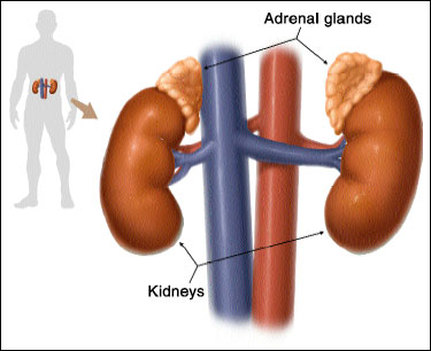Most people have heard of adrenaline — it’s what gets pumping when one is excited and needs to respond forcefully to a situation. Surprisingly though, many tend to be ignorant of exactly where it comes from. If this is you, it’s important to get under the hood a little. Gaining an understanding of adrenaline and adrenaline glands can actually help you improve the quality of your life.
The adrenal glands
Over each kidney is a mound of amorphous gland tissue. These are the adrenal glands. The name “adrenal” is derived from the location of these glands — literally, ad-rene translates to “adjacent to the kidneys.”
Different parts of the adrenal glands produce different hormones, each one vital. Adrenaline is the least critical of those hormones — it energizes the body to get it in readiness to respond to situations that call for an energetic response. While such flight-or-fight responses are important at times, the other hormones, glucocorticoids and mineralcorticoids, regulate vital metabolic functions such as the blood pressure. These functions are fundamental to life.
The adrenal glands, and their connection to your stress level
With their ability to answer challenging life situations with adrenaline, the adrenal glands can produce stress. Sometimes, this can lead to health complications.
Constant exposure to adrenaline can have serious effects on the nervous system, the immune system and the digestive system. The effects of chronic stress are well known – fatigue, a lowered immune response to infectious agents, poor appetite and an inability to focus.
According to DrLam.com, a leading adrenal health network, if you routinely live or work in a high-stress situation, it can be a good idea to talk to a doctor about possible adrenal health challenges and treatments. The doctor is likely to quiz you on your perceived stress levels, mental health and appetite, and arrive at a diagnosis.
If you do experience the effects of stress, it’s time to take action.
Taking care of your adrenal glands
It’s easy to recommend withdrawal from stressful situations. Complying with such advice can be hard, though. To those who find themselves trapped, simple withdrawal may not be possible. It may be possible to restore health in other ways.
Exercise can be an excellent stress reliever
Many studies have found that exercise helps those who are stressed out. Exercise promotes the creation of chemicals known as endorphins. These are natural painkillers. They directly reducing stress by helping promote sleep. It doesn’t take much exercise for these stress-relief effects to kick in. If all you have is 10 minutes for a brisk walk, there’s little else that’s needed. The relief can be long-lasting, as well, often lowering stress levels through the day.
Research by the Anxiety and Depression Association of America has found that those who get even modest amounts of vigorous exercise each day are far less likely to develop anxiety or depression.
Give yourself time to sleep
While you may not be able to change your life situation, you may be able to give your body time to recover from it. A couple of 15-minute power naps through the day and a full 8 hours at night can help.
Of course, sleeping can be tough when you experience stress. Going to bed early, and making sure that the bedroom is completely free of electronic distractions can be a good place to start.
A change is as good as a rest
If stress makes it hard for you to sleep, you should consider activities that involve the mind. Focusing on activities that you do not usually find yourself doing can be tremendously relaxing, even if it takes only minutes at a time. You can try playing with a pet or learning an instrument. Merely giving yourself a chance to experience different emotions can help you unplug from the stress that you feel.
Adrenal fatigue
Sometimes, the adrenal glands can function below the necessary level, causing a collection of symptoms that are together known as adrenal fatigue. When this happens, the glands are no longer able to step up hormone production to answer to stressful situations. Such fatigue can be as undesirable as overactive adrenal glands. Surprisingly, the same forms of self-help work as well for underactive adrenal glands, as for overactive ones — exercise, sleep, and a healthy diet. It doesn’t take long for such positive life changes to begin to come through with their effects. The reward of improved health usually appears within days.
Jenny Walters has extensive knowledge of working within the healthcare industry. She enjoys writing on health and fitness, sharing her knowledge with a wide online audience through health and fitness blogs, lifestyle and Mom sites.
Article Submitted By Community Writer





